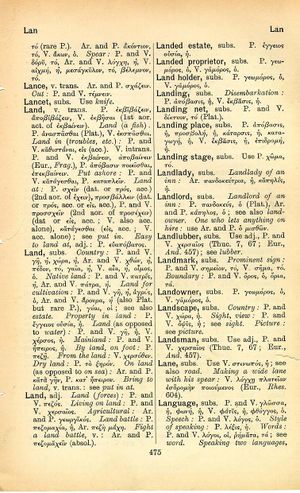land: Difference between revisions
Ὑπὲρ εὐσεβείας καὶ λάλει καὶ μάνθανε → Ea fator atque disce, quae pietas probat → Dein Sprechen, Lernen diene nur der Frömmigkeit
mNo edit summary |
mNo edit summary |
||
| Line 2: | Line 2: | ||
|Text=[[File:woodhouse_475.jpg|thumb|link={{filepath:woodhouse_475.jpg}}]]'''v. trans.''' | |Text=[[File:woodhouse_475.jpg|thumb|link={{filepath:woodhouse_475.jpg}}]]'''v. trans.''' | ||
P. ἐκβιβάζειν, ἀποβιβάζειν, V. ἐκβῆσαι (1st aor. act. of ἐκβαίνειν). | P. [[ἐκβιβάζειν]], [[ἀποβιβάζειν]], V. [[ἐκβῆσαι]] (1st aor. act. of [[ἐκβαίνειν]]). | ||
[[land]] (a [[fish]]). P. [[ἀνασπᾶσθαι]] (Plat.), V. [[ἐκσπᾶσθαι]]. | [[land]] (a [[fish]]). P. [[ἀνασπᾶσθαι]] (Plat.), V. [[ἐκσπᾶσθαι]]. | ||
[[land in]] ([[trouble]]s, etc.): P. and V. καθιστάναι, εἰς (acc.). | [[land in]] ([[trouble]]s, etc.): P. and V. [[καθιστάναι]], εἰς (acc.). | ||
V. intrans. P. and V. [[ἐκβαίνειν]], [[ἀποβαίνειν]] (Eur., ''Frag.''), P. [[ἀπόβασιν ποιεῖσθαι]], [[ἐπεκβαίνειν]]. | V. intrans. P. and V. [[ἐκβαίνειν]], [[ἀποβαίνειν]] (Eur., ''Frag.''), P. [[ἀπόβασιν ποιεῖσθαι]], [[ἐπεκβαίνειν]]. | ||
| Line 22: | Line 22: | ||
[[native land]]: P. and V. [[πατρίς]], ἡ, Ar. and V. [[πάτρα]], ἡ. | [[native land]]: P. and V. [[πατρίς]], ἡ, Ar. and V. [[πάτρα]], ἡ. | ||
[[land for cultivation]]: P. and V. γῆ, ἡ, [[ἀγρός]], ὁ, Ar. and V. [[ἄρουρα]], ἡ (also Plat. but rare P.), γύαι, οἱ; see also [[estate]]. | [[land for cultivation]]: P. and V. [[γῆ]], ἡ, [[ἀγρός]], ὁ, Ar. and V. [[ἄρουρα]], ἡ (also Plat. but rare P.), [[γύαι]], οἱ; see also [[estate]]. | ||
[[properly in land]]: P. [[ἔγγειος]] [[οὐσία]], ἡ. | [[properly in land]]: P. [[ἔγγειος]] [[οὐσία]], ἡ. | ||
| Line 32: | Line 32: | ||
[[by land]], [[on foot]]: P. [[πεζῇ]]. | [[by land]], [[on foot]]: P. [[πεζῇ]]. | ||
[[from the land]]: V. χερσόθεν. | [[from the land]]: V. [[χερσόθεν]]. | ||
[[dry land]]: P. τὸ ξηρόν. | [[dry land]]: P. τὸ ξηρόν. | ||
[[on land]] (as opposed to on [[sea]]): Ar. and P. κατὰ γῆν, P. | [[on land]] (as opposed to on [[sea]]): Ar. and P. [[κατὰ γῆν]], P. [[κατ' ἤπειρον]]. | ||
[[bring to land]], v. trans.: see [[put in at]]. | [[bring to land]], v. trans.: see [[put in at]]. | ||
| Line 48: | Line 48: | ||
[[agricultural]]: Ar. and P. [[γεωργικός]]. | [[agricultural]]: Ar. and P. [[γεωργικός]]. | ||
[[land battle]]: P. [[πεζομαχία]], ἡ. Ar. πεζὴ μάχη. | [[land battle]]: P. [[πεζομαχία]], ἡ. Ar. [[πεζὴ μάχη]]. | ||
[[fight a land battle]], v.: Ar. and P. πεζομαχεῖν (absol.). | [[fight a land battle]], v.: Ar. and P. [[πεζομαχεῖν]] (absol.). | ||
}} | }} | ||
{{nlel | {{nlel | ||
|nleltext=[[γαῖα]], [[γῆ]] | |nleltext=[[γαῖα]], [[γῆ]] | ||
}} | }} | ||
Revision as of 16:30, 14 November 2019
English > Greek (Woodhouse)
v. trans.
P. ἐκβιβάζειν, ἀποβιβάζειν, V. ἐκβῆσαι (1st aor. act. of ἐκβαίνειν).
land (a fish). P. ἀνασπᾶσθαι (Plat.), V. ἐκσπᾶσθαι.
land in (troubles, etc.): P. and V. καθιστάναι, εἰς (acc.).
V. intrans. P. and V. ἐκβαίνειν, ἀποβαίνειν (Eur., Frag.), P. ἀπόβασιν ποιεῖσθαι, ἐπεκβαίνειν.
put ashore: P. and V. κατάγεσθαι, P. καταπλεῖν.
land at: P. σχεῖν (dat. or πρός, acc.) (2nd aor. of ἔχειν), προσβάλλειν (dat. or πρός, acc. or εἰς, acc.), P. and V. προσσχεῖν (2nd aor. of προσέχειν) (dat. or εἰς, acc.; V. also acc. alone), κατάγεσθαι (εἰς, acc.; V. acc. alone); see put in.
easy to land at, adj.: P. εὐαπόβατος.
subs.
country: P. and V. γῆ, ἡ, χώρα, ἡ, Ar. and V. χθών, ἡ, πέδον, τό, γαῖα, ἡ, V. αἶα, ἡ, οἶμος, ὁ.
native land: P. and V. πατρίς, ἡ, Ar. and V. πάτρα, ἡ.
land for cultivation: P. and V. γῆ, ἡ, ἀγρός, ὁ, Ar. and V. ἄρουρα, ἡ (also Plat. but rare P.), γύαι, οἱ; see also estate.
properly in land: P. ἔγγειος οὐσία, ἡ.
land (as opposed to water): P. and V. γῆ, ἡ, V. χέρσος, ἡ.
mainland: P. and V. ἤπειρος, ἡ.
from the land: V. χερσόθεν.
dry land: P. τὸ ξηρόν.
on land (as opposed to on sea): Ar. and P. κατὰ γῆν, P. κατ' ἤπειρον.
bring to land, v. trans.: see put in at.
adj.
land (forces.): P. and V. πεζός.
living on land: P. and V. χερσαῖος.
agricultural: Ar. and P. γεωργικός.
land battle: P. πεζομαχία, ἡ. Ar. πεζὴ μάχη.
fight a land battle, v.: Ar. and P. πεζομαχεῖν (absol.).

